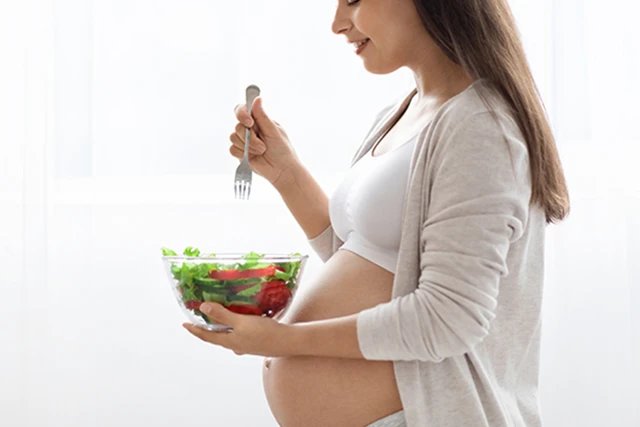A mother’s mental health during pregnancy is extremely important to the development of a baby. Mental well-being affects the physical and psychological health of pregnant women and can significantly influence the baby’s physical formation and development both during pregnancy and after birth. This article will explore how a mother's mental health impacts the fetus, providing mothers with valuable knowledge to better prepare for their pregnancy journey.
The Mother’s Mental State During Pregnancy and Its Impact on the Baby
1. The Impact of the Mother's Physical Health Condition
A mother’s physical health, including weight and existing health conditions, directly affects both her physical well-being and that of the fetus. Pregnant women who are either overweight or underweight may experience issues such as preeclampsia, gestational diabetes, or premature birth, which in turn can impact the baby’s physical and neurological development.
1.1. Pregnancy and Obesity
Excessive weight gain or obesity during pregnancy can pose serious health risks to both the mother and the baby. Complications such as gestational diabetes, high blood pressure, and increased risk of heart disease may arise. These complications can result in serious adverse outcomes, including premature birth, low birth weight, and delivery difficulties. Studies show that obese pregnant women have a 50% higher risk of preterm birth compared to those with normal weight. This elevated risk can make newborns more vulnerable to serious health problems from birth. To minimize potential risks, expectant mothers should maintain a healthy weight during pregnancy to ensure the health of both themselves and their child. This can be achieved by following a balanced diet, engaging in regular physical activity, and undergoing consistent medical monitoring. Healthcare professionals should provide guidance and support to pregnant women to help them manage their weight effectively and overcome challenges related to pregnanc
1.2. Underweight and Frail Body
Being underweight during pregnancy can pose significant health risks for both mother and baby. When a mother is too thin, the baby may not receive the necessary nutrients for healthy development, resulting in low birth weight, slow growth, and increased risk of other health issues. Underweight mothers may also face challenges such as iron and vitamin deficiencies, leading to anemia in both mother and child. Research indicates that underweight pregnant women have a 30% higher risk of giving birth to low-weight infants compared to women with normal weight. Both cases demonstrate that maintaining an ideal weight during pregnancy is vital. It not only helps ensure a healthy pregnancy for the mother but also supports the best possible development for the fetus.
The Mother’s Mental State During Pregnancy and Its Impact on the Baby
2. The Impact of Medical History on the Fetus
If the mother has a history of chronic illnesses such as diabetes, heart disease, or autoimmune conditions, these can potentially harm the fetus. These conditions may increase the risk of miscarriage, premature birth, other pregnancy complications, or abnormal fetal development. A mother with diabetes must strictly manage her blood sugar throughout pregnancy. Otherwise, the baby may grow too overweight and have difficulty in giving birth and may also face a high risk of developing diabetes early in life. This situation highlights the critical importance of managing and treating medical conditions before and during pregnancy. Doing so protects the mother’s health and ensures the fetus develops in the best way possible.
3. The Impact of Harsh Conditions and Psychological Stress
3.1. Harsh Living Conditions
A pregnant woman’s mental health can be negatively affected by the pressures and challenges of modern life. When handled with too much work, exposed to unfavorable work environments, or subjected to domestic violence, family pressure, or societal stress, a mother’s mental state can be seriously compromised. Prolonged stress can affect fetal development, increasing the risk of premature birth and behavioral or psychological issues later in life. A mother working in extreme conditions, under high work pressure, and bearing multiple family responsibilities may lack the time and energy to care for herself. This can lead to anxiety and stress, negatively impacting fetal development. One study shows that pregnant women working in stressful, physically demanding environments face a 20% higher risk of preterm birth than those not subjected to such stress. For example, a mother working in construction, frequently lifting heavy objects and working outdoors, may face more serious health issues than one working in an of
3.2. Pressure from the Mother's Family Circumstances
Family-related stress can significantly influence fetal development. Studies show that high levels of anxiety and stress in pregnant women can lead to negative consequences for the fetus. When a mother faces family challenges, such as financial hardship, relationship issues, or lack of support, it creates a stressful environment that affects the health of the developing fetus. Stress during pregnancy is associated with higher risks of premature birth, low birth weight, and developmental delays in children. This is because stress triggers the release of cortisol, a hormone that can pass through the placenta and affect the baby’s development. Moreover, high stress levels may lead to unhealthy coping mechanisms such as smoking, alcohol use, or poor nutrition, which further endanger the fetus. Therefore, the mother’s relaxed and stable mental state plays a vital role in the fetus’s development. When overwhelmed by family issues, the mother may experience depression, anxiety, and helplessness, all of which can in.
The Mother’s Mental State During Pregnancy and Its Impact on the Baby
4. Poor Mental Health (Autism, Depression, Impulsivity)
Research suggests that the presence of unstable mental conditions such as autism, depression, and mood swings can seriously affect pregnancy. In cases of prenatal depression, poor self-care, inadequate nutrition, and insufficient rest can lead to health problems for the fetus. A depressed mother may neglect balanced eating or fail to follow prenatal care guidelines, resulting in nutrient deficiencies and abnormal fetal development. Therefore, identifying and appropriately supporting mothers with unstable mental health is crucial to safeguarding the health of both mother and child during pregnancy. A mother’s impulsiveness during pregnancy can also affect fetal health and development. Mood instability and unpredictable emotional shifts may create an unstable environment for the fetus, increasing the risk of pregnancy complications. Uncontrolled negative emotions and frequent mood swings can lead to unnecessary stress, negatively affecting fetal health and development.
5. Lack of Awareness or Misconceptions
Insufficient or incorrect understanding of pregnancy care can lead to serious consequences and negatively affect the fetus. Some mothers follow certain advice or consume foods such as:
- To give birth to a baby with fair and beautiful skin: drink lots of coconut water, consume foods rich in folate, folic acid, and saffron milk. Almonds are rich in fiber, magnesium, calcium, vitamin E, and protein.
- To ensure the baby has a high nose bridge: consume foods high in calcium and minerals, vitamin D, protein, fatty acids, vitamin A, C, K...
- To have a baby with big eyes: frequently eat fish, drink coconut water, black beans, eggs, walnuts, sweet potatoes, and coconut water again...
- To have a baby with dimples: eat pomegranate, as it contains vitamin C, vitamin K, folate, antioxidants...
For instance, a mother might follow this advice and eat a lot of animal liver, thinking it will make her baby more beautiful. However, the liver is high in vitamin A, and excessive intake can cause birth defects. Misunderstandings like these, such as believing that more nutrition is always better, can lead to overconsumption and improper nutrition, seriously and negatively impacting fetal development.
The Mother’s Mental State During Pregnancy and Its Impact on the Baby
6. The Importance of Mental Health During Pregnancy
A mother’s mental health throughout pregnancy is a key factor that influences the baby’s health and development. Ensuring that the mother receives adequate support, follows a healthy diet, and lives in a safe, loving environment is essential for optimal fetal development. Taking care of both mental and physical health during this time not only helps mothers navigate this challenging period but also lays a strong health foundation for future generations. For mothers, caring for their mental health is not only important, it's necessary. Equally important is fostering a nurturing environment that promotes happiness and positive thinking, as this can significantly impact fetal development. However, finding methods to enhance a child’s beauty is also important. Mothers should carefully research and apply reasonable approaches to optimize giving birth to a beautiful baby. Let us accompany you on this journey we have methods to help you achieve your dream of having a beautiful baby. Helping you confidently welcome
Website: https://wilimedia.co
Fanpage: https://www.facebook.com/wilimediaen
Email: support@wilimedia.co
